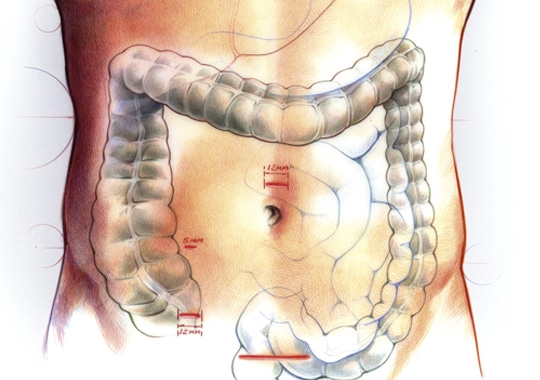
Doctors honestly go to school for a very long time (college, medical school, residency, and possible fellowship). There are many types of surgeons (orthopedic, plastic, pediatric etc.) who really specialize in only certain types of surgery. You also have general surgeons who really see a garden variety of all types of surgeries. Colon surgeons specialize in correcting diseases of the digestive tract. Colon surgeons even do colonoscopies! You can find a colon surgeon near you by using this website. Your GI or doctor will recommend a surgeon typically (sometimes they can be general surgeons). Websites you can use to find reviews of colon surgeon are RateMDs, HealthGrades, and even Yelp. RateMDs currently has the highest rated colon surgeon in the country is Dr. Bidhan Das in Houston, Texas (here is a list of the top colon surgeons in the United States). If you are curious too you can also use the U.S. News and World Report for GI/Colon Surgery here to see if there is a good center near you. Personally, I am okay with traveling a good way if the provider I can get is top notch.
To be board certified in just general surgery a surgeon has to perform a minimum of 750 procedures in a 5 year residency with 150 procedures as the chief resident surgeon, 25 cases have to be in critical cases, 25 cases have to be as a teaching assistant. To be board certified in general surgery also requires a 300 multiple choice exam (study guide is here if you are curious what they learn). Not only do general surgeons have to take an exam but have to maintain their skills by getting re-certified every 10 years. You can check if your surgeon is certified here.
After general surgery residency surgeons who want to specialize in colon surgery typically do a fellowship for additional training. I found a site that shows all the current fellowship programs for colon surgery. Programs vary in training but for instance at the Mayo Clinic their colon residents perform 150 colon resections, 80 laparoscopic colostomies, and 250 colonoscopies. After residency colon surgeons take a board exam for colon surgery which is broken into two parts. The first part is a six hour multiple choice exam followed by the second part which is three thirty minute oral exams from other colon surgeons. Clearly once a colon surgeon practice is done with residency and their fellowship they have received a tremendous amount of education and cases regarding surgery.
My advice would be select a doctor who is board certified in colon surgery, that seems competent, someone that you feel comfortable with, and who has a good track record of performing cases similar to yours. Actually this article (article links to the actual study here) shows that there is an 80/20 rule in colon surgery where a handful of surgeons do most of the procedures. Surgeons who performed more than 162 resections per year had a 50% lower stoma rate and ICU rates, 30% reduction in risk of complications, and 25% reduction in the readmission rate after 30 days compared to the low-volume surgeons (less than 43 resection cases for the year). The Cleveland Clinic performs over 5,000 colon procedures a year (260 for just Crohn's).
Questions for Surgeon (write them down/type them so you don't forget them!).
1. What has been your experience with the surgery you will be performing on me (you can ask for the number of cases they have performed)?
2. How many cases do you typically perform in a week?
3. What surgical option will give the best quality of life for the long run?
4. What are the pros/cons of performing this procedure?
5. Will you be performing the operation?
6. What can I do as a patient to make your job easier?
7. What is my diet after surgery?
8. When can I resume normal activities?
I typically provide the medical provider I am seeing with a detailed history of major events in my Crohn's timeline history (starting Humira, fecal transplant, flares, etc.-they really like seeing the progression of the patient).
I hope this post is helpful if you are trying to find a colon surgeon for Crohn's or ulcerative colitis.
I typically provide the medical provider I am seeing with a detailed history of major events in my Crohn's timeline history (starting Humira, fecal transplant, flares, etc.-they really like seeing the progression of the patient).
I hope this post is helpful if you are trying to find a colon surgeon for Crohn's or ulcerative colitis.